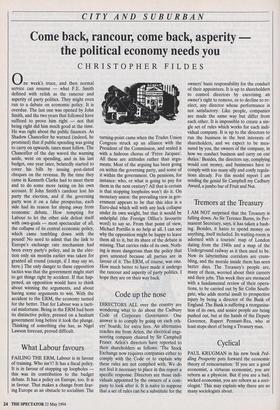CITY AND SUBURBAN
Come back, rancour, come back, asperity the political economy needs you
CHRISTOPHER FILDES
One week's truce, and then normal service can resume — what F.E. Smith defined with relish as the rancour and asperity of party politics. They might even run to a debate on economic policy. It is overdue. The last one was opened by John Smith, and the two years that followed have sufficed to prove him right — not that being right did him much good at the time. He was right about the public finances. As Shadow Chancellor he warned (indeed, he promised) that if public spending was going to carry on upwards, taxes must follow. The Chancellor of the day waved the warning aside, went on spending, and in his last budget, one year later, belatedly started to cover his bills by issuing post-dated cheques on the revenue. By the time they came in Kenneth Clarke had to meet them and to do some more taxing on his own account. If John Smith's candour lost his party the election, and if the governing party won it on a false prospectus, each side had its reason for shying away from economic debate. How tempting for Labour to let the other side defeat itself with own-goals — most spectacular of all, the collapse of its central economic policy, which came tumbling down with the pound! No need to admit that the link to Europe's exchange rate mechanism had been every party's policy, and in the elec- tion only six months earlier was taken for granted all round (except, if I may say so, here.) The only danger to these opposition tactics was that the government might start to get things right by accident. If that hap- pened, an opposition would have to think about winning the arguments, and about having some arguments to win. With the accident to the ERM, the economy turned for the better. That for Labour was a tacti- cal misfortune. Being in the ERM had been its distinctive policy, pressed on a hesitant government long before it took the plunge. Thinking of something else has, as Nigel Lawson forecast, proved difficult.




































































 Previous page
Previous page